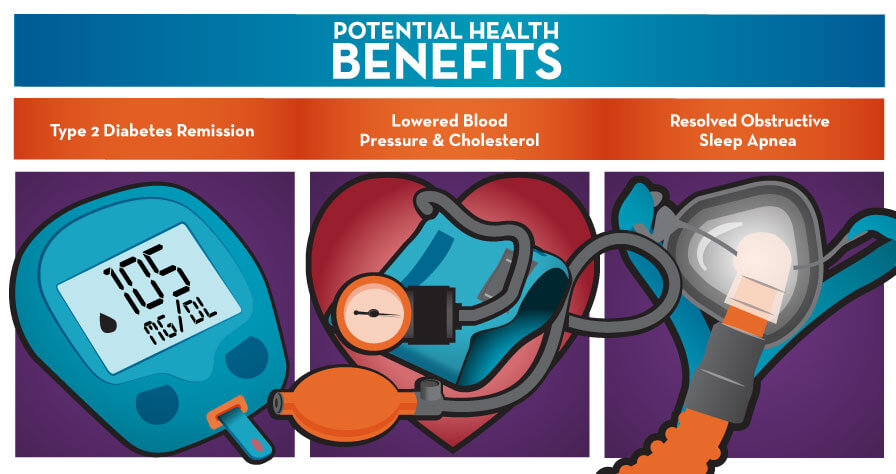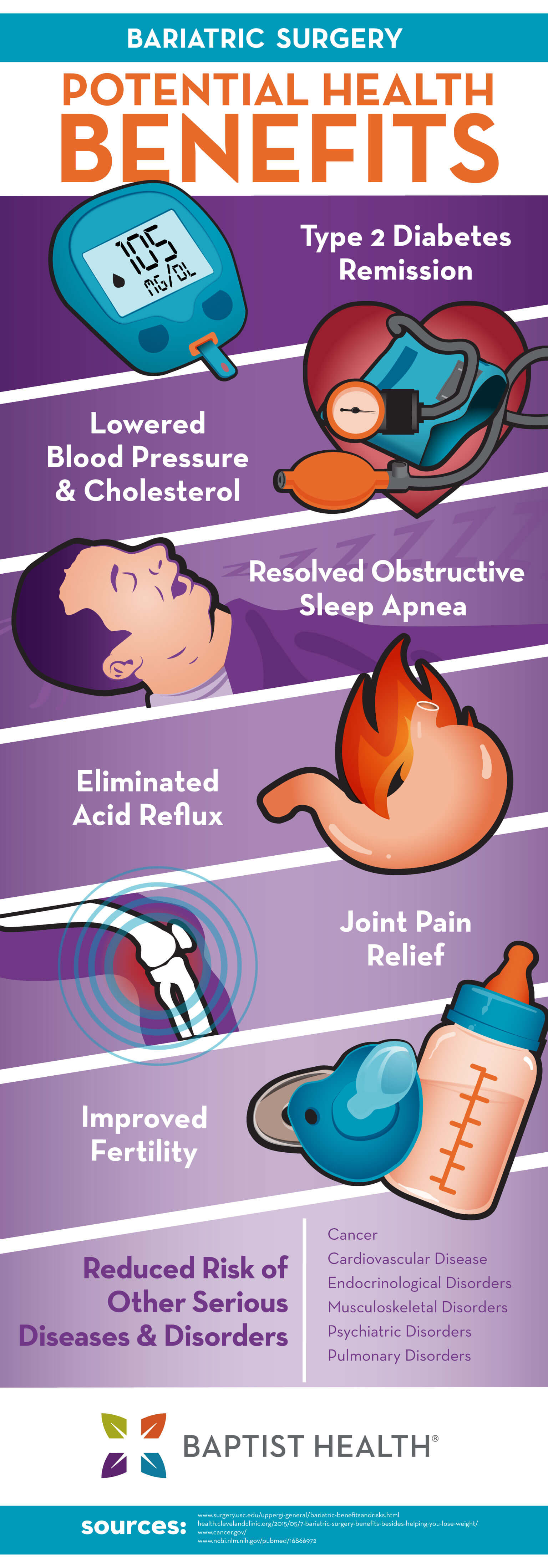What are the Benefits and Advantages of Bariatric Surgery?

Obesity and the conditions caused by the disease are drastically on the rise in America and around the world. Increasingly, obese persons who have not seen success through exercise, diet, and medications are choosing bariatric surgery as a means for weight loss. It’s important to note that bariatric surgery is not cosmetic; fatty adipose tissue is not removed and liposuction is not performed. Bariatric surgery is intended to limit the intake of food or change the way food is absorbed. Typically, surgery is a last resort and should not be taken lightly. If you’re considering bariatric surgery, be sure to talk to your physician about all the potential risks and benefits. Every patient is unique, and outcomes can vary.
Potential Health Benefits After Bariatric Surgery
Type 2 Diabetes Remission
In some cases, Type 2 diabetes can go into remission in as little as two days after surgery. According to the University of Southern California (USC) Keck School of Medicine, 83.3% of gastric bypass patients with Type 2 diabetes went into remission. The Cleveland Clinic corroborates this outcome. In a recent study, they found that nearly all bariatric surgery patients are able to discontinue diabetes medications for at least three years after surgery.
Lowered Blood Pressure and Cholesterol
The USC Keck School of Medicine reports that 75.4% of gastric bypass patients see their high blood pressure issues resolved after surgery. Furthermore, USC notes that cholesterol is lowered in 95% of gastric bypass patients and in 78.3% of gastric banding patients. Because of these post-surgery outcomes, rates of heart disease and stroke are significantly reduced in successful bariatric patients.
Resolved Obstructive Sleep Apnea
Obstructive sleep apnea is associated with loud snoring and long pauses between breaths while sleeping. Many people don’t know they have sleep apnea until they are told by a family member or friend. Those with sleep apnea are at an increased risk of heart disease, high blood pressure and heart attack due to low oxygen levels in the blood. Fortunately, according to USC, sleep apnea is resolved in 86.6% of gastric bypass patients and 94.6% of gastric banding patients
Eliminated Acid Reflux
Acid reflux is the result of complications with the valve that connects the stomach and the esophagus. The condition can cause pain and damage to the esophagus; it may even lead to cancer. Patients who have had a gastric bypass surgery experience alleviated acid reflux symptoms in 98% of cases, based on data from USC.
Joint Pain Relief
Obesity puts excessive stress on joints, including knees, ankles, and hips. The significant and sustained weight loss that bariatric surgery can facilitate helps to alleviate joint pain. Successful patients are able to stop using pain medications and enjoy more active lifestyles.
Improved Fertility
For women, the weight loss that results from bariatric surgery can improve fertility during childbearing years and may lessen pregnancy complications.
Reduced Risk of Other Serious Diseases and Disorders
In addition to the potential health benefits of bariatric weight loss surgery listed above, sustained weight loss can also reduce the risk of other major diseases and disorders.
In a 2001 study conducted by experts at the National Cancer Institute, several cancers were found to be associated with obesity. Weight loss surgery can help reduce the risk of these particular types of cancer:
- Colon cancer
- Postmenopausal breast cancer
- Endometrial cancer (cancer of the uterine lining)
- Kidney cancer
- Esophageal cancer
- Cardiovascular Disease
Cardiovascular disease can take many forms, including coronary artery disease, heart attack, angina, irregular heartbeat, and stroke. Heart disease is closely tied to morbid obesity and high blood pressure. It follows that, due to the substantial weight loss brought about by bariatric surgery, a risk for these conditions is reduced in successful patients.
Endocrinological Disorders
Endocrinological disorders, or hormonal disorders, manifest as complications with regulating appetite, breathing, growth, balance and weight control. Bariatric patients who lose weight and keep it off are less likely to be affected by these conditions.
Musculoskeletal Disorders
As you would expect, significant weight loss can lessen the strain on the skeletal and muscular system; this helps to prevent certain obesity-related conditions such as bone and joint disorders, the risk of fracture and osteoarthritis.
Psychiatric Disorders
Many patients who suffer from obesity report feelings of depression, isolation or low self-esteem. After successful bariatric surgery, patients who have maintained weight loss may have better self-esteem and improved quality of life as it pertains to relationships, socialization, and activities.
Pulmonary Disorders
Obesity’s effects on the respiratory system are often overlooked. Sleep apnea (as mentioned above), asthma, hypoventilation syndrome and chronic obstructive pulmonary disease (COPD) can all be exacerbated by obesity. A reduction in body mass can help control these issues.
If you’ve unsuccessfully tried to lose weight and are experiencing one or more of the comorbidities listed above, talk to your doctor about bariatric surgery options. Keep in mind that, in order to obtain maximal success, lifestyle changes to diet and exercise should be made after your operation.




